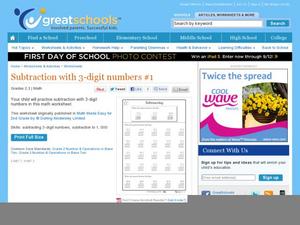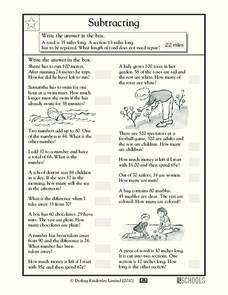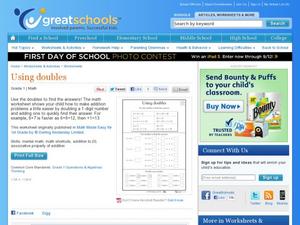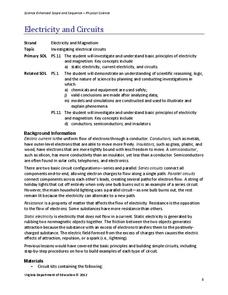Curated OER
Sorting Sets
Here is a simple sorting activity which is appropriate for pre-k and kindergarten learners. Pupils sort each of four items into the correct group, then count the totals and write the numbers in the boxes provided. Along with being a good...
Curated OER
Subtracting Bigger Numbers: 2 and 3-Digit Numbers
Subtraction problems are simple - or are they? Fourth graders subtract 2-digit numbers from 3-digit numbers in different formats, including vertical problems, horizontal problems, and word problems. Use this resource at the end of your...
Curated OER
Subtracting Fractions, Uncommon Denominators
Fractions can be simple to subtract - but what if they have uncommon denominators? Help your fourth and fifth graders subtract and reduce fractions. This page contains 22 sets of fractions, most of which need to be reduced at least once...
Discovery Education
Subtraction with 3-Digits Numbers #1
Looking for a simple way to practice 3-digit subtraction? Use this review page to reinforce your second and third graders' subtraction skills. It includes twenty problems for them to solve, as well as five problems using money. Useful as...
Curated OER
Subtracting
Subtraction word problems are the focus here. Learners are given 15 simple, one-step subtraction problems to solve. Some of them require subtracting money, others use inches and feet, while others use standard numbers. An excellent...
Curated OER
Using Doubles
Bring this easy shortcut to your first grade addition lesson! By adding doubles (6+6, for example), and then adding or subtracting 1, kids learn how to solve simple addition problems with ease. This trick is especially helpful for...
Curated OER
Verb Tenses
Discover how to use proper verb tenses with context clues. Five sentences help first graders decide if they should use -ed or -ing to end simple verbs. Each sentence provides context clues to indicate the time. Use the resource in...
Curated OER
Pizza Sticks
Kids won't just follow a recipe to increase their cooking ability, they'll use it to locate information in a text. They read the simple recipe, then use information from the recipe to fill in the blanks in a story that shows one person...
Re Energy
Build Your Own Biogas Generator
What is biogas and how is it made? After examining background information about the sources of biogas and biogas generators, class members follow the provided information and build a biogas generator that can be used in the classroom.
Skyscraper Museum
Building a Skyscraper
The construction of skyscrapers is no simple undertaking, involving the careful coordination and planning of many different people. The third lesson in this series explores this detailed process by first teaching children about the main...
Asian Art Museum
Create Your Own Samurai (Breastplate) Armor
Your class is going to love this activity. They get out their rulers, cardboard, and paints as they make Samurai breastplates. The simple art lesson lends itself to many different subjects such as, math/measurement, world history, and...
Curated OER
Using Vegetation, Precipitation, and Surface Temperature to Study Climate Zones
Using NASA's Live Access Server, earth scientists compare the temperature, precipitation, and normalized difference vegetation index for four different locations. They use the data to identify the climate zone of each location using...
Curated OER
The Trash We Pass
Where does our garbage go? What is the difference between a recyclable and non-recyclable item? Pose these important, but often overlooked, questions to your class and invite them to consider the lasting and damaging effects of the...
Super Teacher Worksheets
Find Somebody in This Class Who....
Here is a fun and simple ice breaker in which your young learners will interview their classmates to discover which ones have had similar interests and experiences.
BBSRC
Discovering DNA: The Recipe for Life
A pinch of adenine, a dash of thymine and ta-da, you have life! Well, it's not quite that simple, but through this series of activities and experiments young scientists learn about the structure of DNA and how it contains the recipe for...
Society of Petroleum Engineers
Renewable and Nonrenewable Energy
Energize an environmental science unit on natural resources with this collection of instructional materials. From simple coloring sheets for primary grade children, to guiding questions for a high school research report, a wide variety...
Ask a Biologist
Human Skeleton Anatomy Activity
Young biologists piece together the puzzle of the human body with this simple anatomy worksheet. Presented with a picture of the human skeleton, students are challenged with the task of correctly identifying the 27 bones indicated on the...
Corner Stone For Teachers
Parent-Teacher Communication Log
Communicating, and documenting that communication, is made a whole lot easier with this log. Instructors begin by creating a separate log for each class member, listing the phone numbers of the primary caregivers and other adult contacts...
CommonCoreSheets.com
The Civil Rights Movement Timeline
Using this simple worksheet, your learners will have the opportunity to practice reading timelines while learning about key events during the civil rights movement in the United States.
Virginia Department of Education
Electricity and Circuits
Electrify your classroom as you lead pupils through a series of steps to demonstrate basic principles of electricity and magnetism. They design a simple circuit and test this for static electricity and current electricity. Next, they...
Sunlight Cal-Tech
Chromatography of Plant Pigments
Through a hands-on activity, an acetone-spinach solution is pre-made and learners use this solution to separate the pigments found in spinach using chromatography. The comprehensive resource includes an analysis and conclusion questions.
Noyce Foundation
Sewing
Sew up your unit on operations with decimals using this assessment task. Young mathematicians use given rules to determine the amount of fabric they need to sew a pair of pants. They must also fill in a partially complete bill for...
EngageNY
Solving Quadratic Equations by Completing the Square
Many learners find completing the square the preferred approach to solving quadratic equations. Class members combine their skills of using square roots to solve quadratics and completing the square. The resource incorporates a variety...
02 x 02 Worksheets
Inverse Variation
Discover an inverse variation pattern. A simple lesson plan design allows learners to explore a nonlinear pattern. Scholars analyze a distance, speed, and time relationship through tables and graphs. Eventually, they write an equation to...

























